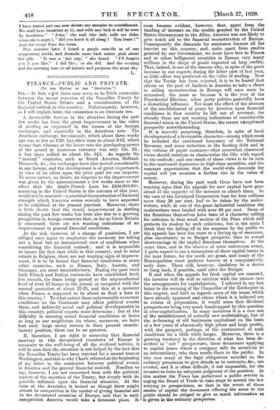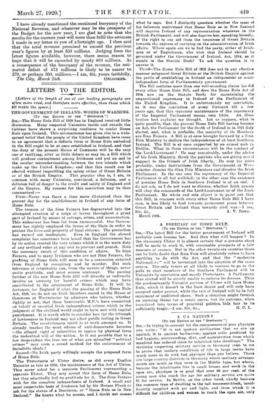FINANCE—PUBLIC AND PRIVATE.
[To THE EDITOR OF -THE "SPECTATOR."] SIR,—At first s'g'it there may seem to be little connexion between the recent rejection of the Versailles Treaty by the United States Senate and a consideration of the financial outlook in this country. Unfortunately, however, as I will explain later, the connexion is an intimate one.
A favourable feature in the situation during the past few weeks has been the great improvement in the value of sterling as expressed in the course of the foreign exchanges, and especially in the American rate. The American exchange, for example, which about three weeks ago was as low as 3-20, has since risen to about 3-82, which means that whereas at the lower rate the purchasing-power of the pound in American currency was only 13s. 2d., it has since rallied to about 15s. 84d. As regards the " neutral " countries, such as South America, Holland, "Denmark, &c., the exchanges have also moved considerably in our favour, and the development is of great importance, in view of its effect upon the price paid for our imports. To some extent, no doubt, an impetus to the improvement 'was given by the announcement a few weeks since to the effect that the Anglo-French Loan for 1100,000.000, maturing in the United States in the autumn of this year, would not be renewed—a practical demonstration of financial strength which America seems scarcely to have expected . to be exhibited at the present juncture. Moreover, there is little doubt that the steady improvement in sterling during the past few weeks has been also due to a growing recognition in foreign countries that, so far as Great Britain is concerned, there are not wanting indications of an improvement in general financial conditions.
. At the risk, however, of a charge of pessimism, I am obliged once again to emphasize the necessity for taking not a local but an international view of conditions when considering the financial outlook ; and it is impossible to ignore the fact that while in this country, and to some extent in Belgium, there are not wanting signs of improve- ment, it is to be feared that financial conditions in some -other countries, such as France, Italy, Austria, and Germany, are most unsatisfactory. During the past week both French and Italian currencies have established fresh 'low records, the franc being quoted at the unprecedented level of over 57 francs to the pound, as compared with the normal quotation of about 25-25, and this at a moment when France is supposed to be about to float a loan in this country ! To what extent these unfavourable economic conditions on the Continent may affect political events there, and indirectly social and political developments in this country, political experts must determine ; but of the difficulty in securing sound financial conditions at home so long as our neighbours (to whom, moreover, we have -lent such large sums) remain in their present unsatis- factory position, 'there can be no question.
If, therefore, I am right in assuming that financial recovery in the devastated countries of Europe IS necessary to the well-being of all the civilized nations, it will be seen that the situation is not helped by the fact that the Versailles Treaty has been rejected for a second time at 'Washington, and that is why I have referred at the beginning of my letter to the connexion between political events in America and the general financial outlook. Needless to say, however, I am not concerned here with the political aspects of the rejection of the Treaty, but simply with its possible influence upon the financial situation. At the time of the Armistice it looked as though there might almost be competition in the matter of giving financial aid to the devastated countries of Europe, and that in each -competition America would take a foremost place. It soon became _evident, 'however, that, apart from the funding of interest on the credits granted by the United States Government-to-the Allies, America was not likely to _give much aid to the financial reconstruction of Europe. -Consequently the demands for assistance became all the heavier on this country, and, quite apart from credits granted by our Government, we must have lent to -France and to other belligerent countries in Europe very many millions in the shape of goods exported on long credits. That, indeed, is one of the reasons why, in spite of the groat increase in our exports during the latter part of last year, so little effect was produced on the value of sterling. Now that the Treaty has been rejected, it is to be feared that efforts on the part of bankers in America to take a share in aiding reconstruction in Europe will once more be restrained, the more so because it is the year of the Presidential Election, when party politics generally have a disturbing influence. Nor must the effect of the absence of the establishment of .peace by America upon financial conditions in that country be left out of account, for already there are not wanting indications of considerable financial strain in the United States, the recent exceptional prosperity notwithstanding. It is scarcely surprising, therefore, in spite -of local developments of a favourable character—among which must be included the continued buoyancy of the National Revenue, and some reduction in the floating debt and in the volume of paper currency—that somewhat chastened views should continue to characterize the City with regard to the outlook ; and one result of these views is to be seen in the continued depression in high-class securities, and the constant expectations that the world-wide demands for capital will yet occasion a further rise in the value of money.
Moreover, during the past week there have not been wanting signs that the appeals for new capital have gone ahead of the capacity of the investor to absorb them. In the case of the Liverpool Corporation loan for four millions more than 30 per cent. had to be taken by the under- writers, while in one of the great industrial combines the underwriters were landed with over 60 per cent. Some of the flotations themselves have been of a character calling for criticism in that small section of the Press which still protects its readers by such criticisms, but in -the main I think that the falling off in the response by the public to the appeals has been due more to a drying up of resources, plus uncertainty as to Budget prospects, than to actual shortcomings in the capital flotations themselves. At the same time, and in the absence of some unforeseen event, 1-quite expect to see a resumption of these capital issues in the near future, for the needs are great, and many of the Municipalities must perforce borrow at a comparatively early date. There will, however, doubtless be a desire to hang back, if possible, until after the Budget. If and when the appeals for fresh capital are renewed, the investor will do well to criticize with the utmost care the arrangements for capitalization. I referred in my last letter to the -warning of the Chancellor of the Exchequer in this respect, and both as regards some of the issues which' have already appeared and others which it is believed are in course of preparation, it would seem that dividend prospects are being very much handicapped by this question of over-capitalization. In many instances it is a case not of the establishment of actually new undertakings, -but of the re-forming of old businesses capitalized on the basis of a few years of abnormally high prices and large profits, with the prospect, perhaps, of the continuance of such conditions for a little while longer. Moreover, there is a growing tendency in the direction of what has been de- scribed as " sale " prospectuses, these documents applying to capital issues where a company sells its securities to an intermediary, who then resells them to the public. In this case many of the legal obligations entailed ou the ordinary prospectus to give details as to contracts, &.c., are evaded, and it is often difficult, if not impossible, for the investor to form an adequate judgment of the position. In this matter the Times has performed a public service in urging the Board of Trade to take steps to amend the law relating ,to prospectuses, so that in the event of these resales of capital the document offering the same to the public should be obliged to give as much information as is given in the ordinary prospectus. I have already mentioned the continued buoyancy of the National Revenue, and whatever may be the prospects of the Budget for the new year, I am glad to note that the results for the current year will more than fulfil the estimate I made in my letter to you of a fortnight ago. I then said that the total revenue promised to exceed the previous year's figures by at least 350 millions. Judging from the latest figures available, however, there seems reason to hope that it will be exceeded by nearly 400 millions. As a consequence of the buoyancy of the revenue, the esti- mated deficit of 473 millions is likely to be nearer to 370, or perhaps 350, millions.—I am, Sir, yours faithfully,



































 Previous page
Previous page